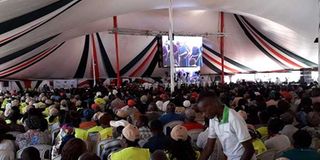Uhuru to launch Huduma Namba listing in Machakos

Machakos residents await the arrival of President Uhuru Kenyatta at Masii Boys High School for the launch of the Huduma Namba registration on April 2, 2019. PHOTO | KENNEDY KIMANTHI | NATION MEDIA GROUP
What you need to know:
- According to the Interior Ministry, 31,500 kits have been distributed in readiness for the mass rollout next month.
- Machakos Governor Alfred Mutua asked Kenyans to turn up in large numbers for the listing.
- It is a free government service and is expected to cost between Sh5 billion and Sh6 billion.
President Uhuru Kenyatta is Tuesday morning expected to launch the roll out of the National Integrated Identity Management System (Niims) — dubbed Huduma Namba in Masii town, Machakos County.
Kenyans will have their data captured in biometric kits.
This is after a pilot project was done in Kisii, Kisumu, Wajir Nairobi, Uasin Gishu, Kajiado, Baringo, Marsabit, Embu, Makueni, Busia, Nyandarua, Kiambu, Kilifi and Tana River counties.
According to the Interior Ministry, 31,500 kits have been distributed in readiness for the mass rollout next month covering the country’s 8,500 sub-locations.
MOBILISE LOCALS
In the plan, assistant chiefs have the responsibility of mobilising locals and helping get the information the government hopes will reduce the burden of a citizen carrying a national identity card, Kenya Revenue Authority personal identification number, driving licence, passport, NHIF and NSSF cards and other documents.
Machakos Governor Alfred Mutua asked Kenyans to turn up in large numbers for the listing saying it would be for their own good.
The mass registration is for Kenyans aged six years and above and will run for 45 days.
FREE SERVICE
It is a free government service and is expected to cost between Sh5 billion and Sh6 billion.
On Monday, the High Court allowed the government to launch the Huduma Namba registration but with several tough conditions pending the hearing and determination of a suit against the programme.
The State was barred from forcing Kenyans to register and from using the data to withhold any services or bar anyone from accessing public facilities.
In addition, the government cannot also share the collected information with international bodies.





